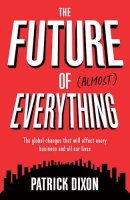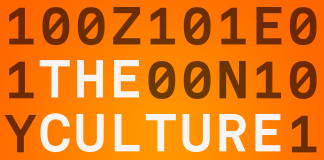
The Future Of Almost Everything by Patrick Dixon

Read the summary below and get the key insights in just 10 minutes!


- How the “six faces of the future” will interrelate to drive rapid change, and
- How human emotions – positive and negative – influence the six faces.

“Tomorrow as History”
The years from now through 2030 will offer many of the threats and opportunities humanity will face in even the longer term. Picture a cube with faces inscribed “Fast, Urban, Universal, Tribal, Radical” and “Ethical.” This cube, spelling “FUTURE,” spins with the force of human emotions.
Fast: The Pace Accelerates
In today’s rapid-flow world, with few unchanging certainties, people value the solidity of stable things. Yet in an interconnected world, tiny events cause ripples, leading to quick waves of change.
A desire for stability creates advantages for enduring, family-owned firms. “Short-termist” companies stuck in the benchmarking rut will face difficulties and risk. Also expect:
- Debt defaults and bigger, messier “boom and bust” cycles will dwarf today’s market volatility. Asian economies – fueled by aspirational middle class consumers – will surpass the growth of the European and US economies. Central banks will loosen the reins on inflation. Globalization will accelerate.
- Most IT will go mobile. Antsy consumers will no longer tolerate slow, rigid, complex access. Small, cheap, fast and flexible are in the future. The established telecom business model will crumble as new players – such as the Chinese organizations Tencent and Xiaomi – push smart devices and wearables. Web interfaces will build on implant technology; for instance, cochlear implants will lead to “biodigital brains.” Apple will extend its interests in the cloud and in quantum computing. Infotech firms will invest in the cloud, the Internet of Things and in big data – which adds the “megarisks” of cybercrime and cyberwar. As outsiders snoop deeper into your life, your own ability to spy will increase.
- Blockbuster films, mostly US-made, will pack movie theaters. E-books will grow in popularity, but people still will value print. Emerging nations like India will see a boom in print news media but, overall, in a short-attention-span era, people will want entertainment, not an overload of news.
Urban: Conditions Grow Crowded
Most of Earth’s population will live in Asian cities by 2025. Urban migration will drive GDP growth. With a global population of more than nine billion by 2040, the world will struggle to sustain its current consumption levels.
The coming megacities of 10 million to 20 million people – will spawn megainfrastructure and megafacilities. Radical urban innovation and demographic shifts will brew revolutionary changes, such as:
- African growth will reap a dividend from the relative peace since 2005. As investment pours in from big corporations, African cities will expand. Emerging nations like Nigeria will boom; established regional economies like South Africa will struggle to compete.
- Asia’s declining birth rate stems partly from China’s one-child policy. As urban workers age, young workers from rural areas will replace them. Europe will experience a baby boom and increased immigration.
- Longer-lived old people will strain health care. Improved screening and treatments will lead to better prognoses in cancer, stroke and heart disease. Pension deficits will foment crisis as life expectancy extends. Lab-grown organs, stem-cell therapies and other innovations – such as head transplants – could fuel the search for cells that resist dying.
- Better access to health services, affordable dentistry and cheap generic drugs will improve life. But as outbreaks of SARS, bird flu and Ebola show, fast-mutating, fast-spreading viral pandemics will threaten humanity globally.
- Biotech will delve deeper into genomes and the basis of life. Couples may clone themselves to overcome infertility. Biotech innovations, such as biological computers, human-animal hybrids, gene-altered animals, patented genes and cloning using cells from dead bodies, will challenge beliefs and moral codes.
Tribal: Embracing Our Roots
People are tribal. They cleave to groups they know and understand, including “relationships, brands, families, communities and nations,” and they create new tribes.
Benign tribal instincts help social and cultural bonding. Entrenched tribal differences lead to bloodshed and refugee crises such as seen in Syria and Sudan. Tribalism will shape the future in various ways:
- Germany dominates the tribal European Union. Greece’s debt problems highlight tribal strains. Scottish independence will break up the UK. Russia’s nostalgia for the old power of the USSR keeps President Vladimir Putin in power.
- Despite aggressive nuclear posturing, a worldwide conflict is unlikely. But dangers multiply from “messy weapon” conflicts and “hybrid wars” – which lack a clear war-peace distinction. US military priorities must change.
- Tribalism drives corporate change. Family businesses benefit from deep loyalty and trust, while “tribal leaders” skillfully draw enterprises together.
- People resist old-style marketing, so brands like Apple go “glocal” – simultaneously global and local – to reach subtribes of consumers. With a big “grey market” and a dwindling youth market, brands seek “neuromarketing” and personal recommendations.
- Your family is your tribe. Parents protecting their kids from a “hypersexual culture” call for censorship. Interfamily diversity will increase.
- Alcohol remains a big killer, taking 3.3 million lives worldwide per year. Tobacco companies will target poorer, developing nations. A failed “war on drugs” leads to liberalization of drug laws. Cannabis legalization will progress as attitudes change. More designer drugs will come on the market.
- Psychologist Steven Pinker offers evidence that society is becoming less violent. Internet crime is rising fast, but statistics rebut the public perception that violent crime is endemic.
Universal: Borders Melt Away
“Universalism” is the converse of tribalism. Globalism is a powerful universalizing force pressing nations to open up existing barriers to trade and information flow. As a result:
- Expect more trade agreements among regional trading blocs and greater centralization of power, taxes and legislation. “Megacorporations, will work efficiently but will cut consumers’ choices as they carve up markets.
- “Global citizens” will work all over the world, traveling frequently.
- International outsourcing will decline as living standards improve. Logistics websites will help shippers cut empty-truck inefficiencies. Manufacturing using 3D printers at home will see a slow uptake. Your car might drive itself, but robots will not “take over.”
- The 21st century will see enormous growth in China and India. A smart, aspiring young workforce – many English-speaking – will drive India’s growth. India will struggle with infrastructure and China with an aging, gender-imbalanced population. Both will contend with rampant corruption. China’s internal territorial disputes will escalate.
- Energy independence will affect its attitudes toward interventionism. The state will increasingly fund health care. Gun violence will persist in the US.
- Most people will buy from a few megachains. Anticipate eating out more often; expect high-end food retailers to prosper and to integrate online (and mobile). Offline retailers already losing sales to their own online stores, and to more “click-and-collect” shoppers.
- Small retail banks cannot compete with new banking forms, such as hybrid “telcobanks” and Google and Apple payment systems, so they will expand. National stock exchanges won’t survive; investors will trade globally 24/7. Corporate banks will advise the ultrawealthy elite. The insurance and reinsurance industries will boom.
- Expect high-speed rail, ultraefficient airlines, jumbo cruise ships, fuel-efficient semi-automated cars and – for the rich – “space tourism.”
- People will learn online. India and China will be centers of prestige university education.
- Deregulation in legal services will bring cheap, easy judicial access.
- Global citizens will expect corporate diversity, ethical treatment and equal opportunities.
Radical: Expect the Unexpected
Communism’s downfall reshaped the world, leaving the US as the sole superpower and de facto world “policeman.” Access to audiences and resentment against the “new world order” will foment tensions and even terrorism. Revolutionary changes include:
- Ideology-driven terrorists will attack big-impact targets, possibly with germ warfare. For most people, the threat from terrorism will remain “effectively zero.”
- Democracies will falter, as citizens tire of corrupt politicians. Dictatorships will struggle to endure, as their people rise up. Theocratic states will emerge, based on holy laws.
- In the Middle East, further international acceptance of Palestian statehood will alarm Israel, trouble will escalate for Saudi Arabia’s ruling monarchy, Iran will quietly allow more social freedoms, and Turkey will face Kurdish separatists and Syrian pressure.
- Tackling global warming requires innovation and investment, including emissions cuts; recycling; carbon capture; wind, solar, wave and tidal power; supergrids; a fossil-fuel switch from coal to natural gas; thorium fission, even nuclear fusion plants and a rethink on wasteful biofuels. Despite talk of peak oil, new reserves and fossil-fuel sources such as shale gas could last centuries. Though a CO2-polluting nation today, China’s investment in wind and solar will make it a leader in clean green tech. By 2100, millions will benefit from free power.
- Climate change will exacerbate water crises. Governments will regulate and build infrastructure, like dams. Nations will clash in water wars. Terrorists will target supplies.
- Food production changes will include less waste, less reliance on meat, new meat substitutes, more genetically modified crops and animals, a “green revolution” in farming in Africa, and a global boom in fish-farming.
- People will work long after the traditional retirement age and will do more part-time jobs.
- A nonaligned charismatic leader from an emerging nation with a radical “Big Idea” may rally billions of people to a new cause.
Ethical: Morality Endures
Ethics – people’s views of right and wrong, their values, their sense of purpose – shape the future. Despite change, human nature will be stable. Will a universal ethic emerge? What kind of world does humankind want? Consider these possibilities:
- Life is fleeting, so how should you spend it? If you feel qualms about what you do, that’s your conscience speaking. Are you building a better world? Do you treat others well?
- “Happynomics” will look into what brings contentment, for example, faith, sufficient income, good jobs and stable relationships. People will question arms sales and raise cyber-related issues like pornography and bullying.
- Global wealth boosts ethics by raising living standards. People loathe wealth inequalities and corporate greed, with multibillionaires at one extreme and slaves at the other. Philanthropy will grow, as will nonprofits, social enterprises and volunteering.
- Challenges will include ethical codes for artificial intelligence robots.
- With children in developing nations dying for lack of basic medical supplies, should scientists spend time and money on life extension and augmentation projects? A minefield of health-ethics issues lies ahead, centering on such matters as euthanasia, cloning, stem-cell therapies and gene patenting.
- Expect a world that values its traditionally female aspects, for instance, flexibility and empathy. Increased feminization will affect companies, work and society.
- Billions of people equate ethics with spiritual beliefs. Many seek meaning and moral guidance. Religions will keep growing, as will strife within and among them. Organized religion will spread in emerging nations, with a more “personal spirituality” evolving in the West. A massive new religion may emerge worldwide, touting “the final revelation.”
- Ethics-based “global governance” may emerge in response to people’s wish for peace.
“Shaping Your Future”
Engage, observe, travel and empathize. Stay watchful, focused and involved. Even if you feel disenfranchised, you can make a difference. Your individual actions send out powerful ripples that may shape the future. Think about what really matters to you, and reach for it.[/text_block]






